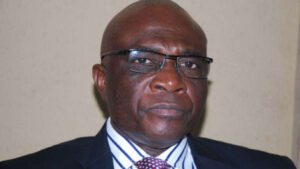
Thievocracy: The paradox of Nigeria’s relationship with money (1)
By Jimoh Olorede, PhD
A keen analytical observation would show Nigeria had, in 1999, only returned to thievocracy, which is also known as kleptocracy, and not democracy. The simple, common, widely-accepted definition of democracy as a system of consent of the governed is “government of the people, by the people and for the people,” while kleptocracy refers to a government by those who seek chiefly status and personal gain at the expense of the governed.
The obsessive disposition to money and wealth acquisition by some Nigerian leaders and public officials is obviously counterintuitive to national development initiatives. And unless we jettison the ignoble and ignominious practices, we would only continue struggling to develop, but in futility. One of the greatest problems in Nigeria is the social value we place on money and wealth acquisition. This is a social attitude common to many Nigerians, and which has now become an attribute with which we are known as a people.
Money is a means to an end, but it’s unfortunate that many Nigerian leaders see it as an end itself. Yes, having money is good, just as a man needs it for many reasons including basic life necessities — food, shelter, clothing and healthcare. A man also needs money for comfort and convenience, to improve his quality of life, for security and stability, for personal growth and development, for freedom and choices and for relationships, connections and impact, by showing love and giving back to his community. Contrarily however, the obsession of some of our officials with money shows they love it more than their needs and what it means to have it, just as this ignominious disposition obviously demeans our reputation as a nation!
Regrettably, many Nigerian leaders perceive money as the ultimate goal. They fail to understand that having money doesn’t translate to happiness or fulfilment. Fulfilling life purpose comes from how we use our money, not just having it.
Many of the officials who have access to the nation’s treasury by virtue of their position as public office holders love money more than they actually need it. If some of them had their way, they would sell the entire nation just for their personal aggrandisement, forgetting they would consequently no longer have a country of their own. After all, this set of money-mongers with excessive love for money might be suffering from kleptomania, which is a mental illness in which someone has a strong desire to steal.
We are in a mess of socioeconomic and political troubles in Nigeria today mainly because of corruption and ineptitude of the past custodians of our nationalism as an independent state. Estimates by the Economic and Financial Crimes Commission (EFCC) in 2014, for instance, suggest that corrupt Nigerian officials stole around $130 billion USD between 2003 and 2013. This evidence further estimated that in 2015, Nigeria lost over $150 billion to corruption between 2003 and 2013. Similarly, the African Development Bank’s report in 2013 showed that Nigeria lost approximately $120 billion to corruption between 2003 and 2012, and the World Bank also estimated in 2014 that corruption and fraud in Nigeria’s oil sector alone amounted to around $60 billion between 2003 and 2012.
Paradoxically, Nigeria’s accumulated external debt in this same period — between 2003 and 2013, was approximately $12.4 billion, according to BudgIT, Debt Management Office (DMO) on national debt management framework, and Central Bank of Nigeria (CBN). The obsessive disposition to material wealth by some of the nation’s officials, especially those trusted with power and authority, is absurdly incongruous. This set of black sheep of the Nigerian nation would steal money from our treasury, run it aground, leave it empty, and hide their loot in foreign countries to which we consequently run and beg for financial aid. Is it not an absurdity and incongruity that more often than not, we apply and always receive funds already looted from our country and kept abroad, given back to us as foreign loans.
For instance, over $700 million dollars stolen and kept in foreign countries have been received by the Nigerian government in the last four years. In just a year, between May 29, 2015 and May 25, 2016, President Muhammadu Buhari-led government received nearly $9.1 billion dollars in stolen money and assets. On May 1, 2020 and in November 2022, the United States of America repatriated the sum of $311.797,876 and $20.6 million dollars respectively in assets stolen by former Nigerian dictator Sani Abacha and his co-conspirators. These facts in figures and dates, were as obtained from the U.S Embassy, the U.S Ministry of Justice, and the Economic Times.
More so, a recent figure as at 2023, shows Nigeria’s total public debt stock was N87.91 trillion ($114.35 billion). Out of this figure, external debt amounts to N31.98 trillion ($41.59 billion), while domestic debt gulps the remaining N55.93 trillion ($72.76 billion). This is what the present administration of Asiwaju Bola Tinubu inherited.
But for corruption, leadership ineptitude, selfishness, national and social value misplacement, and endemic systemic failure, we obviously have no reason to be in debt as a nation blessed with numerous natural resources. Strangely, we are fiscally strangled by multilateral debts from institutions like the World Bank and the African Development Bank. We are indebted with throat-squeezing bilateral loans from countries like China, France, Japan, and Germany, and with commercial debts from Eurobonds and other international capital markets. These, among others, were Tinubu’s inheritances when he received the baton of leadership on May 29, 2023, as President and GCFR of the most populous African nation, with expectations that he would change the adversarial narrative with innovative initiatives as contained in his Eight-point Renewed Hope Agenda.
Dr. Olorede, federal institution’s Head of Department and strategic communication analyst, writes in from Iragbiji, Osun State, via oloredejimoh@gmail.com/08111841887.




